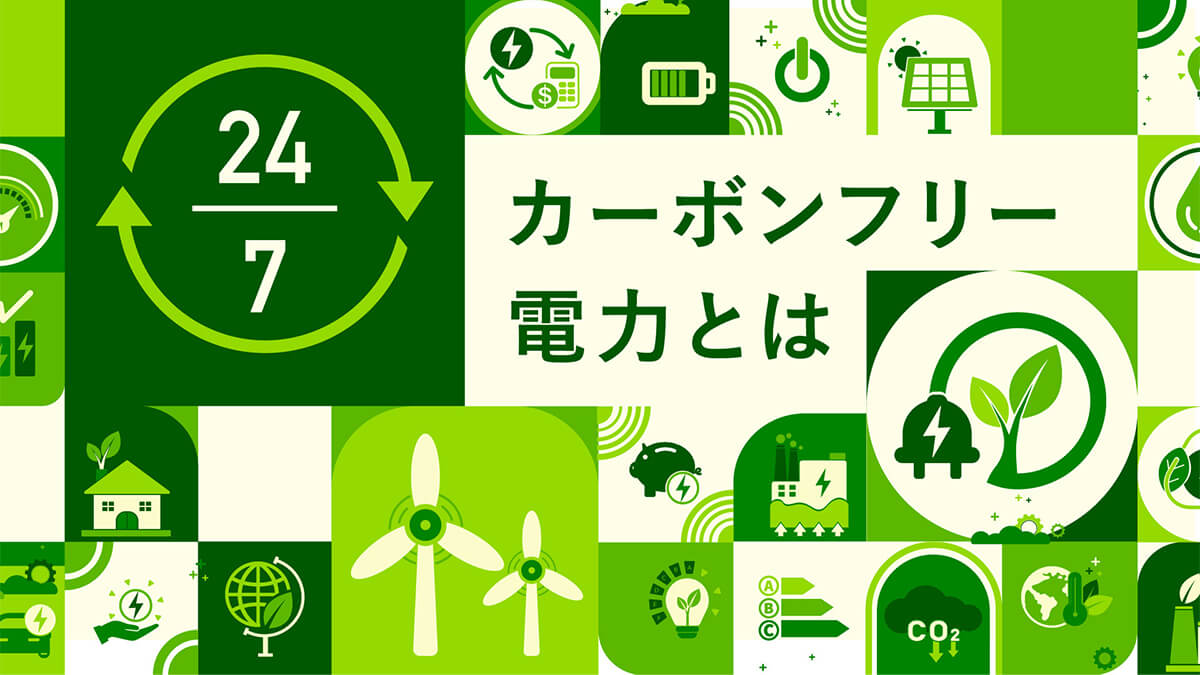
24/7 Carbon-Free Electricity: Insights from JERA and TOHO’s Groundbreaking Collaboration
1 September 2025
Addressing decarbonization has become an essential agenda item for companies. A new trend is changing the way electricity is procured: “24/7 Carbon-Free Electricity.” This approach marks a shift from the conventional annual renewable energy offsets to a more precise and truly carbon-free electricity supply.
Originating with leading global companies, this movement goes beyond technology—it is reshaping how businesses think about sustainability.
In Japan, JERA is leading the way in adopting 24/7 Carbon-Free Electricity. In November 2024, JERA and its subsidiary JERA Cross, in partnership with Toho, began Japan’s first1 commercial use of zero-CO2-emission thermal power fueled solely by hydrogen. This cross-industry collaboration is opening up new business opportunities while serving as a model for Japan’s decarbonization and green transformation (GX).
This article explores the key concepts behind 24/7 Carbon-Free Electricity and highlights the pioneering JERA-Toho initiative as an example of this global trend.
1 According to JERA research
Understanding 24/7 Carbon-Free Electricity: Key Differences from Conventional Renewable Procurement
“24/7 Carbon-Free Electricity” means exactly what it says: electricity that is free of CO2 emissions every hour, every day, 365 days of the year. This mechanism enables the continuous provision of carbon-free electricity by flexibly combining various CO2-free power sources—such as solar, wind, and hydrogen—and adjusting supply to match demand at different times of day.
Kengo Ichikura, Representative Director and President of JERA Cross, a JERA subsidiary that provides decarbonization solutions as a one-stop GX partner for businesses, explains:
“In the past, companies could claim to be ‘100% renewable’ if the amount of renewable energy they purchased matched their annual electricity use. Today, however, there is a shift toward a more rigorous approach: ensuring that the electricity consumed is carbon-free in real time.”
Traditional renewable energy procurement was based on quantitative annual matching scheme, where companies purchased Renewable Energy Certificates (RECs) equivalent to their annual electricity consumption and thereby claim to be “100% renewable.”
However, this approach leaves gaps when renewable supply does not align with demand, such as at night or during periods of low solar or wind output. For example, while clean solar energy may be abundant during daylight hours, fossil fuel-derived electricity often fills the gap during nighttime or cloudy conditions.
Although certificate trading is common, its actual CO2 reduction impact is limited. Companies relying solely on REC to claim “100% renewable” increasingly face criticism for greenwashing, particularly in Europe and the U.S.. This has driven calls for greater transparency in energy procurement and a shift toward real-time carbon-free electricity sourcing.
24/7 Carbon-Free Electricity addresses this issue by guaranteeing that the electricity consumed is carbon-free at every hour of the day.
Google Leads the Way: Launch of the Global “24/7 Carbon-Free Energy Compact”
Google first championed 24/7 Carbon-Free Electricity, publishing white papers from 2018 onward to promote hourly matching over annual offsets. Google aims to power all of its global data centers and offices with 24/7 Carbon-Free Electricity by 2030 and has already begun achieving round-the-clock carbon-free supply at some data centers by combining different renewable sources—such as solar during the day and wind in the evening—to meet demand hour by hour.
Other major tech companies, including Microsoft, soon followed suit, establishing 24/7 Carbon-Free Electricity as a global trend.
In September 2021, the United Nations launched the “24/7 Carbon-Free Energy Compact” (24/7 CFE Compact) to accelerate effective decarbonization. As of July 2025, more than 170 companies worldwide participate, including around 10 from Japan—among them JERA, Mitsubishi Electric, Osaka Gas, and ENECHANGE.
JERA Group’s Technological Edge: Pioneering 24/7 Carbon-Free Electricity in Japan
In Japan, the JERA Group has established itself as a pioneer in delivering 24/7 Carbon-Free Electricity. Its strength comes from three core areas:
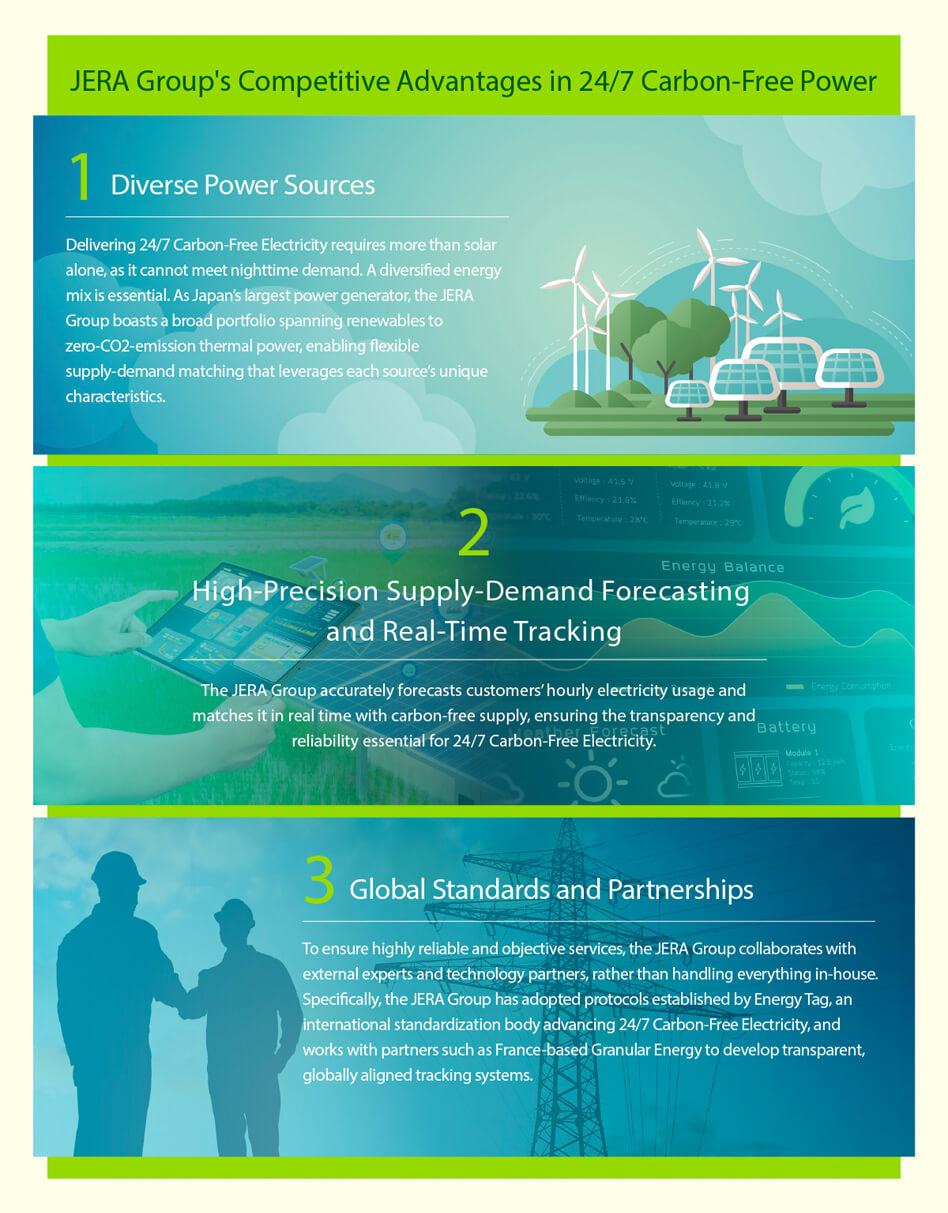
Envisioning A Future Where A “Godzilla” Film Is Produced with Decarbonized Power: From Vision to Reality with TOHO
The collaboration between JERA and TOHO began in 2021 with a top-level dialogue between JERA Global CEO and Chair Yukio Kani and TOHO President & CEO Hiro Matsuoka. TOHO wanted to advance decarbonization while delivering inspiration through entertainment. During that dialogue, the idea of producing a Godzilla film with decarbonized power emerged, marking the start of a unique cross-industry partnership.
In 2022, TOHO announced its management strategy, TOHO Vision 2032, with a goal of achieving carbon neutrality by 2050. However, the company was still searching for concrete ways of making this a reality.
In the autumn of 2023, JERA organized an internal workshop at TOHO to discuss the fundamental reasons for decarbonization. The employees articulated the significance of the vision more clearly and, as a result, created the “TOHO Green Vision Book 2023.”
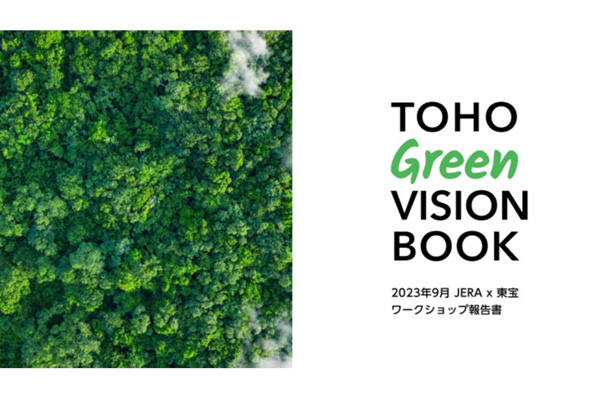
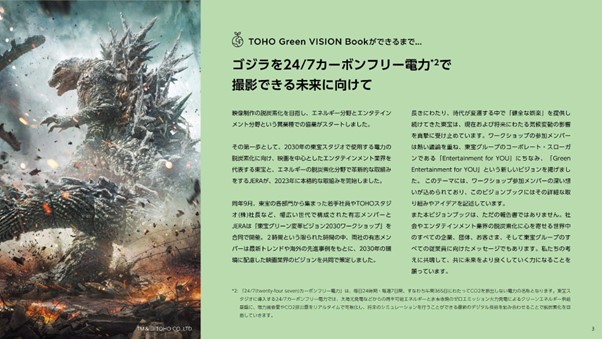

The book depicts employees’ vision for a greener film industry by 2030 and maps out ways to contribute to a sustainable society through entertainment.
At JERA’s suggestion, a video incorporating the workshop participants’ voices was also produced and presented to TOHO’s Board of Directors. This left a strong impression on President Matsuoka and the leadership team, helping to reinforce the initiative’s importance throughout the company. Gradually, this awareness spread across the company, allowing employees to see the connection between decarbonization, their daily work, and TOHO’s broader purpose.
While the TOHO Group operates across a range of businesses, this collaboration focused on one clear target: decarbonizing TOHO Studios, Japan’s largest film studio, which produces around 300 titles annually.
Achieving Japan’s First Commercial Hydrogen Power Generation
On November 29, 2024, JERA began supplying electricity to TOHO Studios from a hydrogen-exclusive thermal power facility at Sodegaura Thermal Power Station in Chiba Prefecture. This marked Japan’s first commercial use of power generated entirely from hydrogen-fueled zero-CO2-emission thermal generation.
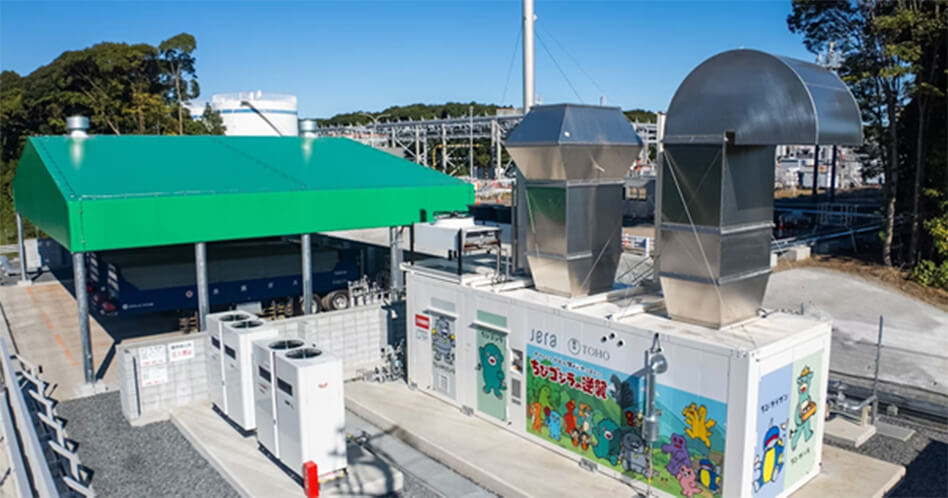
TM & © TOHO CO., LTD.
Given its unprecedented nature, the project faced numerous challenges: purchasing and installing new equipment within the power plant, navigating various regulatory approvals, and ensuring safety standards. Each challenge was addressed step by step through a process of trial and error.
Looking ahead, JERA plans to gradually transition to green hydrogen derived from renewable energy, with the goal of achieving true 24/7 Carbon-Free Electricity by 2030.
While 24/7 Carbon-Free Electricity is a global inevitability, its economic viability is equally critical.
Traditional fossil fuel-based electricity is vulnerable to fuel price fluctuations, often resulting in volatile power costs. By contrast, 24/7 Carbon-Free Electricity utilizes comparatively price-stable sources such as renewables and hydrogen, enabling predictable pricing and a steady supply. This price stability is especially valuable for businesses with large, continuous power needs, offering a distinct competitive advantage.
Producing Japan’s First Zero-Emission Video
As part of this collaboration, JERA and TOHO produced Japan’s first “zero-CO2-emission video” using 24/7 Carbon-Free Electricity.
“NIKKEI GX TALK” is a zero-emission video created using entirely 24/7 Carbon-Free Electricity. In this first episode, JERA Global CEO and Chair Yukio Kani and TOHO President Hiro Matsuoka discuss their visions for decarbonization and transformation.
Addressing the Energy Trilemma: The Societal Significance of 24/7 Carbon-Free Electricity
Combining renewable energy with zero-CO2-emission thermal power offers a path to solving the “energy trilemma”—the challenge of simultaneously achieving stability, affordability, and sustainability.
Renewable energy is highly sustainable but often hindered by weather-related variability and higher costs. By pairing renewables with zero-CO2-emission thermal power, it becomes possible to maintain environmental benefits while also delivering stable, cost-efficient energy.
Driving New Business Opportunities through GX
JERA Group is not only an energy supplier—it actively supports the transformation of its clients. Moving to 24/7 Carbon-Free Electricity is more than a technical shift; it often requires a cultural change within organizations.
For TOHO, the initiative also created new business opportunities.
Shogo Fukuda, who leads JERA’s Solution Service Group within its Service Division, says that this new solution to produce video content at TOHO Studios using carbon-free electricity is already drawing attention from environmentally conscious companies.
Through this partnership, the GX promoted by JERA Cross is now reaching Japan’s entertainment industry, driven by the adoption of 24/7 Carbon-Free Electricity.
Looking ahead, Fukuda notes that as 24/7 Carbon-Free Electricity is rolled out to match each industry’s characteristics, they expect many companies and sectors to pursue GX that generates new value from existing businesses, just as TOHO has done. The key is an approach that goes beyond changing the power supply alone, enabling true value creation for our clients.
Future Challenges, Japan’s Role and the Path Forward
Wider adoption of 24/7 Carbon-Free Electricity will require further technological progress, including battery storage, hydrogen power, digital innovation, and AI. Western tech companies and specialized providers are already leading the market, offering not just power supply but integrated solutions with advanced tracking and reporting capabilities.
Policy and regulatory frameworks are equally crucial. In Japan, the Ministry of Economy, Trade and Industry (METI) has established a working group to explore domestic systems aligned with the updated GHG Protocol. Key needs include revisions to the Non-Fossil Certificate System and institutional designs enabling hourly tracking to support the expansion of 24/7 Carbon-Free Electricity.
As of July 2025, only a small number of Japanese companies are pursuing 24/7 Carbon-Free Electricity. The JERA Group aims to enhance its global competitiveness through pioneering initiatives, leveraging Japan’s strengths in hydrogen and battery technologies, and delivering services aligned with international standards.
From Small Steps to Steady Progress: Climbing the Mountain Together
Kengo Ichikura of JERA Cross offers this encouragement to corporate leaders working on decarbonization:
“24/7 Carbon-Free Electricity and GX may feel overwhelming. Decarbonization can seem like a distant mountain peak, with no clear path to the summit. But you don’t need to tackle everything at once. Take one small step forward, and the way ahead becomes clearer, allowing you to plan your next move. Our role is to illuminate the way and help create new options along the journey. Let’s move forward together, one step at a time.”
“Nikkei Brand Document” explores the challenges behind the JERA–TOHO collaboration.
RELATED STORIES
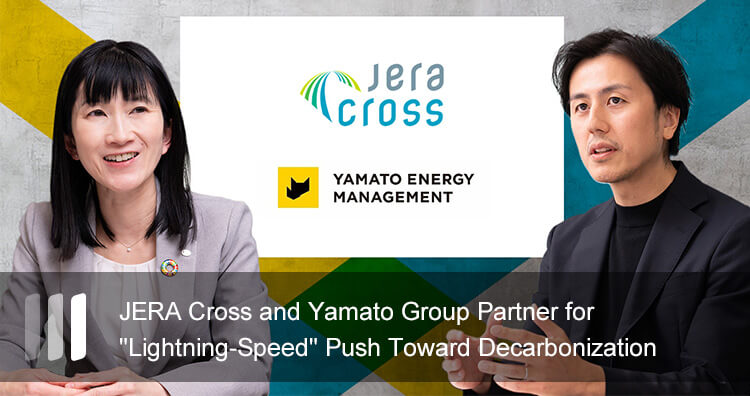
JERA Cross and Yamato Group Partner for “Lightning-Speed” Push Toward Decarbonization

JERA Cross Launched to Accelerate Corporate Green Transformation (GX)

JERA and Toho: A Cross-Industry Collaboration Aiming for “Zero CO2 Emission Movies”
Toho, a leader in Japan's film industry, has embarked on a collaboration with JERA in the latter’s effort to expand clean power.

